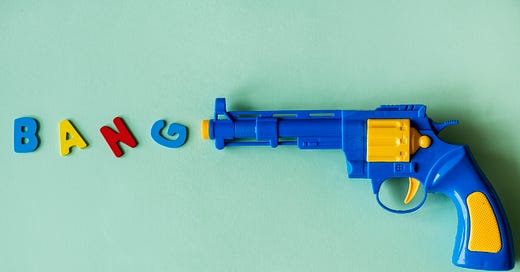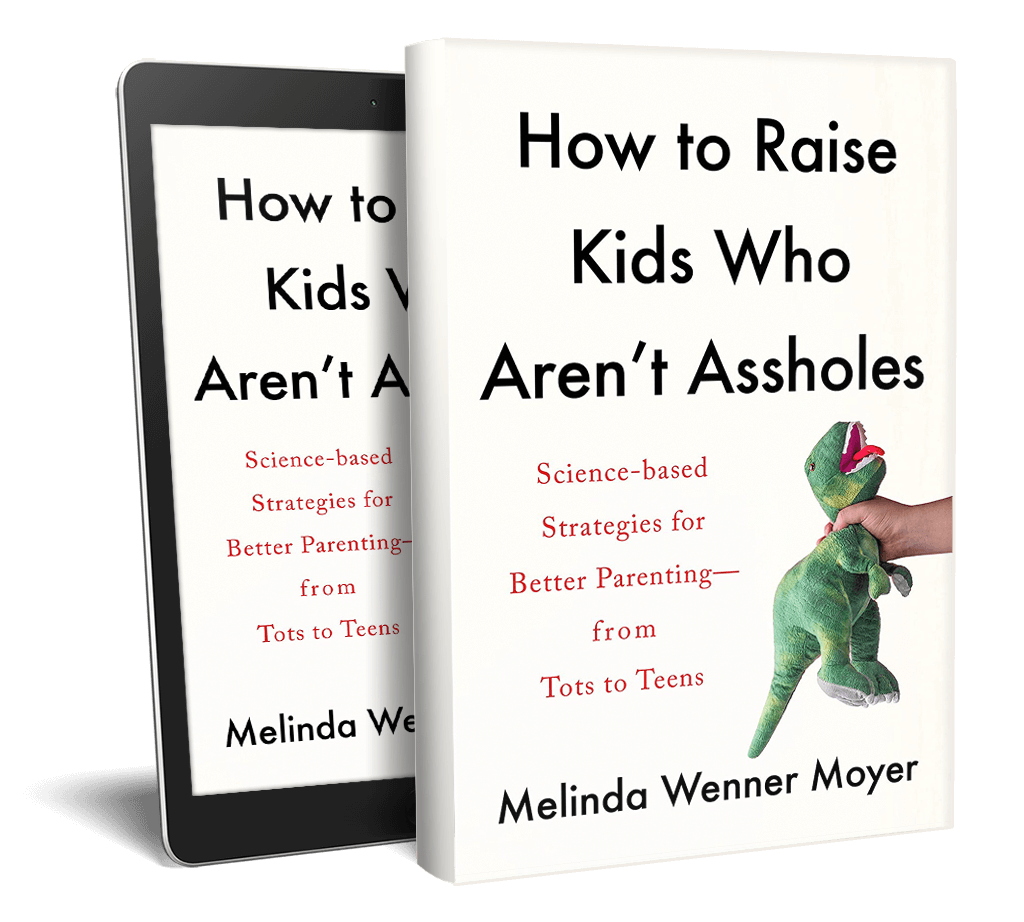My Kid Pretends Everything Is a Gun
What should you do if your kids are always battling bad guys?
Dear Is My Kid the Asshole,
All my son ever wants to do is play “Superhero Wars.” Everything he finds morphs into a gun. Pew pew pew, you’re dead! It makes me uncomfortable, and I don’t know what to do. Should I make a house rule that gun play isn’t allowed? Is my kid the asshole?
Sincerely,
Pacifist Mom
Dear Pacifist Mom,
This is such a good question, and one I’ve asked myself over the years. (My son is almost ten and he’s still obsessed with Marvel superheroes.) But as much as I dislike violence and the idea of my child ever holding a real gun, I believe, based on the science, that pretend play like this is developmentally appropriate and even beneficial for kids — with a few important caveats.
Play is important for kids for so many reasons: It’s how they learn; it’s how they process their emotions; it’s how they work through complicated issues they encounter in the world. Developmental psychologists say that so-called aggressive pretend play — when kids kill “bad guys,” pretend to shoot guns and the like — is no different. Kids see or hear about violence in their communities, homes, or in movies or TV shows, and playing helps them process it. Kids also like playing superheroes because it gives them a sense of power at a time in their lives when they have very little.
Psychologist Michael Thompson, co-author of the book Raising Cain: Protecting the Emotional Life of Boys (which is excellent, by the way), told me that parents often only see the bad side of this kind of play, but that it has plenty of positive aspects too. “Instead of seeing the heroic aspects of it, people now either react to the 'that's not nice,' 'that's not cooperative,' or they react to the 'Oh my god, this is a foreshadowing of future violence,’” he said. “In another day and age, people would have looked and thought, this is mythic play, heroic play — these are the stories that boys have always told.” (Aggressive play isn’t only observed in boys, but it is seen more often in boys than girls, in part due to cultural expectations surrounding masculinity.)
Other child psychologists and educators agree that aggressive pretend play is healthy and appropriate, and that preventing it could actually be detrimental. As University of Maine researchers wrote in a 2011 paper on the topic, parents’ and teachers’ “discomfort with certain play themes might inhibit play that could be valuable to children.” In another paper, early childhood education researchers at the University of Nevada went so far as to argue that “the omission of aggressive play in early childhood programs fosters the underdevelopment of social, emotional, physical, cognitive and communicative abilities in young children.”
This not just because play is good for kids — it’s also because, when we chide our kids for doing something that comes naturally to them, we can inadvertently fuel feelings of shame. We don’t want our kids to think there’s something wrong with them for wanting to play Superhero Wars, because there’s not. Of course, as I’ll explain more in a minute, you should have conversations with your kids about the dangers real guns pose, and even talk about how violence is rarely the most constructive solution to a problem. But when kids are immersed in imaginary play, and they aren’t actually hurting others, we should, for the most part, let them be. (This all said, families of color may have a very different risk/benefit calculus when it comes to letting their kids play with toy guns, given the heartbreaking story of Tamir Rice and the many, many others like him who have been victims of racist assumptions and violence.)
It’s worth pointing out that some preschools have tried to ban aggressive pretend play, especially when it involves play guns — but most have failed miserably. It becomes a game of whack-a-mole: As soon as teachers censure one form, another pops up. And bans like this can, paradoxically, reinforce other kinds of unsavory behavior. In a paper titled “Bang Bang! Gun Play, and Why Children Need It” (social science papers have the best titles!), educator Diane Rich explains that when teachers tried banning gun play in one preschool, students still did it — they just pretended they were doing something else when they were caught. Nothing to see here. Rich concludes that although the teachers were presumably trying to teach the kids that violence isn’t OK, they instead were tacitly encouraging them to lie.
There’s no evidence, either, that violent play or gun play makes kids more aggressive. In fact, a small 2013 study involving 59 preschoolers reported that kids who were more aggressive during pretend play were actually less aggressive in the classroom, and that the aggressive players were kinder to their classmates, too. This doesn’t mean that violent play causes kids to be nicer — this kind of study can’t establish causality — but it certainly doesn’t raise any red flags about this kind of play, either. Another study published in 2018 followed kids over time from age 5 to 15, finding that kids who played aggressively with toy weapons when they were little were no more likely than other kids to engage in criminal behavior as teens.
But earlier, I did mention some caveats. Here are three things to keep in mind if your kids love to shoot off bad guys.
If your child actually hurts other kids when they play, talk to your pediatrician.
There’s an important distinction to be made between between aggressive pretend play and actual aggression. If your child is harming other kids while playing, even if you’re not sure it’s intentional, it might be a sign of an impulse-control problem and be worth discussing with a pediatrician or child psychologist. This doesn’t mean anything is wrong with your kid! But a doctor or therapist can provide you with strategies to help you understand what’s happening and how best to support your child.
Tell your child not to play with real guns — and if you have guns in your home, lock them away safely, and check that the same happens in other homes your child visits.
You should absolutely talk to your kids about real guns and how dangerous they are, and that they should never, ever play with them. But the reality is that nothing you say will ensure that they will leave real guns alone if they come across them. So if you keep a gun in your home, store it in a locked place, unloaded, with the ammunition stored in a separate location. And even if you don’t own a gun, you still need to take steps to protect your kids while they’re in other people’s homes.
Here’s a excerpt from a 2015 Slate piece I wrote that helps to explain why this is so important:
Marjorie Sanfilippo, a psychologist at Eckerd College in Florida, has conducted a series of terrifying experiments illustrating that boys and girls simply don’t listen when you warn them about guns. In her first study, published in 1996, she let pairs of 4- to 6-year-old children play in a room with various toys including real and toy guns. Then she and a local police officer spent 30 minutes educating one of the children in each pair about the dangers of guns—among other things, that they are never to be touched without a parent’s permission and that kids should always find an adult if they come across one. A week later, she put the pair of children back together in the same room again to play. “What we found is that the children who had the lessons played with the guns just as much as the children who didn’t—and they didn’t leave the area to get an adult, and they didn’t stop the friend from playing with it. It was as if they’d gotten no lessons whatsoever,” she recalls. In a subsequent experiment, she enrolled one group of preschool children in a weeklong firearm-education session while another group of kids had no training. Again, the intervention had no effect on the children’s likelihood of playing with guns. “There’s no amount of teaching that can overcome that natural curiosity about guns,” she concludes.
So if you don’t want your kids to play with guns, you have to make sure they don’t find any. And this means that when your child goes into another person’s home, you need to ask whether any guns they have are stored safely. If the thought of posing this question makes you uneasy — maybe you worry about offending the other person — consider that “people who own guns are often more comfortable having these conversations than people who don’t,” says Jennie Lintz, director of public health and safety at the nonprofit Brady Center to Prevent Gun Violence. If you still feel weird, try it this way: “Call the parent and say, ‘My son is fascinated with guns — he’s going through a phase — so I just want to make sure that you don’t have any real guns accessible.’ Because then you’re saying, ‘I want to protect your child, too,’ ” Sanfilippo says. If guns aren’t stored in a way that makes you comfortable, invite the child over to your home instead.
Encourage your kid’s play to be creative and imaginative — that’s better than, say, re-creating violent scenes from their favorite movies.
Play is most constructive for kids when it draws from their imagination. Some types of play can do this better than others, and some types of toys foster creative play more than others. A basic rule of thumb is that the more realistic a toy is — the more it looks like the “real thing” — the less creative a child has to be while using it. This is why teachers love wooden blocks and Legos; kids have to use their imaginations to make something from them.
So while there’s nothing intrinsically wrong with having realistic toy guns in your house, these toys may encourage kids to do more imitative play rather than true imaginative play. “Imitation is not really play, and when it’s not really play, children are not really working on the things they need to work on,” said Diane Levin, an early education specialist at Wheelock College in Boston and the author of The War Play Dilemma, when I spoke to her for Slate. When kids make toy guns out of Legos, on the other hand, they’re being much more creative.
If you’re playing with your kids, you can even nudge them in the direction of more imaginative play, by asking them questions and encouraging them to think outside the box. “What would happen if that bad guy had invisibility powers and you couldn’t shoot him?” Or “Is there anything we could do to turn the bad guy good?”
Housekeeping: I’m going to start publishing my newsletter every Sunday, rather than every other Sunday. And I’m very excited about what’s to come. Stay tuned!
Click here to submit a question for me to address in a future newsletter. I’ll keep you anonymous, promise!






